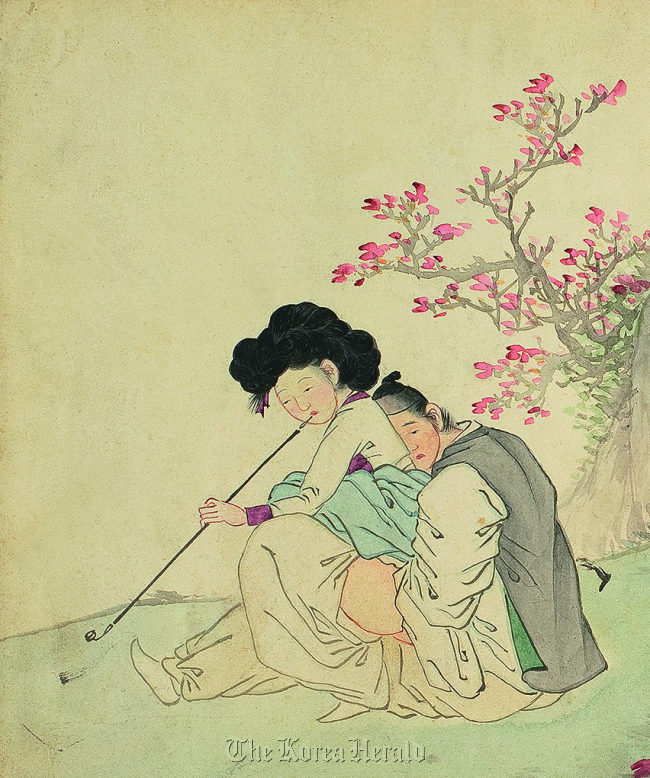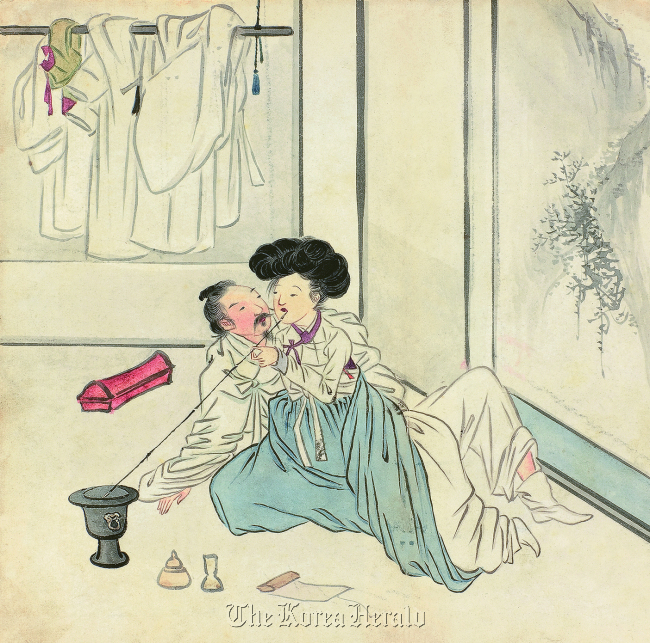Joseon’s erotic paintings to go on display
2013-01-06 18:44
 |
| “Unudocheop” (The Album of Cloud and Rain Painting, early 19th century) by Kim Hong-do (Attributed). (Gallery Hyundai) |
The exhibition at Gallery Hyundai features two complete collections of erotic paintings made by prominent painters in Korean history Shin Yun-bok and Kim Hong-do, as well as genre paintings that are being shown to the public for the first time.
The original Joseon erotic paintings, called “chunhwa” (literally means spring paintings), weren’t revealed to the public until recently as owners are usually unknown and hesitate to disclose them to the public.
But after years of planning and using all her “connections,” Park Myeong-ja, the president of the gallery, finally pulled off the project.
 |
| “Geongonilhoecheop” (The Album of the Joining of Heaven and Earth, 1844) by Shin Yun-bok (Attributed). (Gallery Hyundai) |
The highlight of the exhibition is Kim’s “Unudocheop” (The Album of Cloud-and-Rain Paintings) and Shin’s “Geongonilhoecheop“ (The Album of the Joining of Heaven and Earth).
“They have high artistic value because they managed to keep artistic factors while explicitly depicting erotic scenes,” said Yoo Hong-joon, former head of the Cultural Heritage Administration and author of the best-selling book series “My Field Trip Diary to Cultural Heritage Sites,” at the guided exhibition tour on Friday.
The paintings show erotic scenes of people in Joseon. Kim’s paintings depict sexual scenes of commoners with a touch of humor. Shin mainly portrayed intercourse between a man of noble birth and female courtesan, or gisaeng.
Yoo explained how erotic paintings are reflections of each country’s sentiment and society.
“Many Mongolian paintings have sexual scenes taking place on horses. There are many yoga poses in Indian paintings. Chinese paintings have exaggerated actions like the actions in Chinese martial arts movies. In Japanese paintings, you don’t recognize who is the man and woman because they are in full costume with their genitals accentuated,” he said.
“Korean erotic paintings are full of lyrical depiction. You can see it in paintings in which a man and a woman are making love beside azalea flowers in full bloom and lush willow trees. What’s notable in Korean erotic paintings is that background landscapes take up significant portion of the paintings, he explained.
Paintings of sexual scenes were secretly “made-to-order” in the conservative society with deep-rooted Confucian values. It is also said that Shin was expelled as a royal painter for making sexual paintings.
“The Korean erotic paintings of the 19th century have sarcasm and humor toward the hierarchical and conservative society. The charm of Korea’s erotic paintings is that it can be romantic and humorous at the same time,” wrote Lee Tae-ho, a Myongji University professor, in the exhibition review.
Erotic paintings of Korea emerged later than those in neighboring Japan and China, where such paintings appeared in the 16th and 17th centuries “because of the deep-rooted Confucian values in the society and the late commercial development,” according to Lee.
The exhibition also reveals 50 genre paintings of the commoner painter Kim Jun-geun for the first time.
Kim’s paintings are widely exhibited at major museums in the world including the Berlin Gallery in Germany and the Smithsonian Museum in the U.S. as they were purchased by foreign visitors to Korea who bought them to add to their collections.
His paintings will be shown at Dugahun Gallery, located behind Gallery Hyundai.
Kim’s paintings, considered to have high artistic value as well, offer glimpses into Korean people’s lives and culture featuring scenes of wedding, funerals and other ceremonies and rituals.
The exhibition “Refined and Tasteful Life of Joseon Dynasty” will run from Jan. 15-Feb. 24 at Gallery Hyundai in Jongno, Seoul. Admission is 5,000 won for adults and 3,000 won for children and teenagers. The second floor exhibition featuring the erotic paintings are open to those 19 and up. For more information, call (02) 2287-3591.
By Lee Woo-young (wylee@heraldcorp.com)


